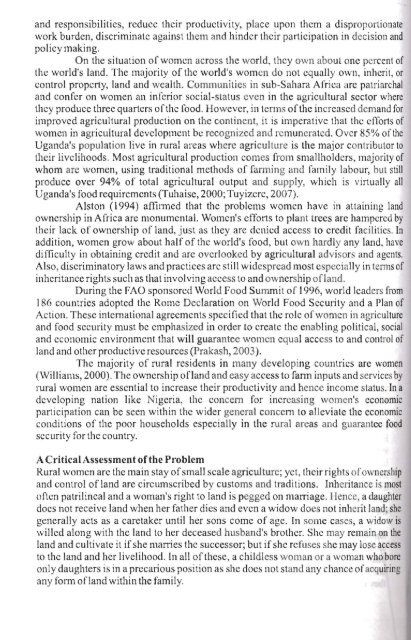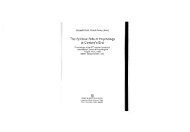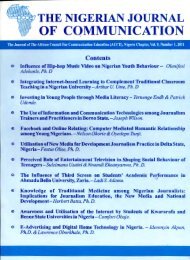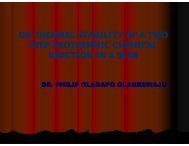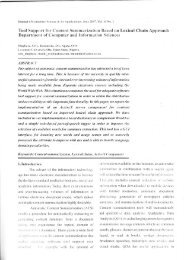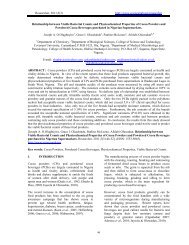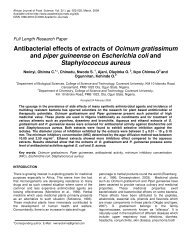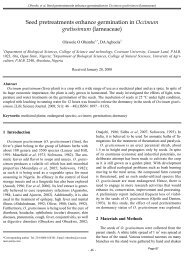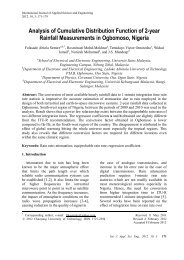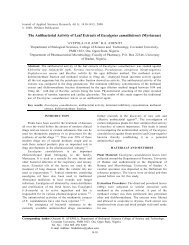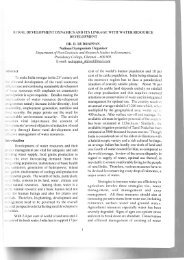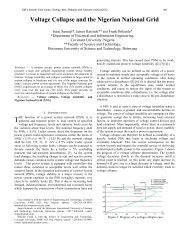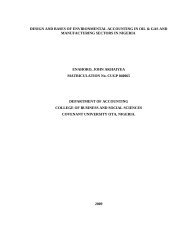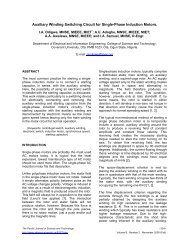Download (8Mb) - Covenant University Repository
Download (8Mb) - Covenant University Repository
Download (8Mb) - Covenant University Repository
Create successful ePaper yourself
Turn your PDF publications into a flip-book with our unique Google optimized e-Paper software.
and responsibilities, reduce their productivity, place upon them a disproportionate<br />
work burden, discriminate against them and hinder their participation in decision and<br />
policy making.<br />
On the situation of women across the world, they own about one percent of<br />
the world's land. The majority of the world's women do not equally own, inherit, or<br />
control property, land and wealth. Communities in sub-Sahara Africa arc patriarchal<br />
and confer on women an inferior social-status even in the agricultural sector where<br />
they produce three quarters ofthe food. However, in terms oCthe increased demand for<br />
improved agricultural production on the continent, it is imperative that the efforts of<br />
women in agricultural development be recognized and remunerated. Over 85% oflhe<br />
Uganda's population live in rural areas where agriculture is the major contributor to<br />
their livelihoods. Most agricultural production comes from smallholders, majority of<br />
whom are women, using traditional methods of farming and family labour, but still<br />
produce over 94% of total agricultural output and supply, which is virtually all<br />
Uganda's food requirements (Tuhaise, 2000;Tuyizere, 2007).<br />
Alston (1994) affirmed that the problems women have in attaining land<br />
ownership in Africa are monumental. Women's efforts to plant trees arc hampered by<br />
their lack of ownership of land, just as they are denied access to credit facilities. In<br />
addition, women grow about half of the world's food, but own hardly any land, have<br />
difficulty in obtaining credit and are overlooked by agricultural advisors and agents.<br />
Also, discriminatory laws and practices arc still widespread most especially in tenns of<br />
inheritance rights such as that involving access to and ownership ofland.<br />
During the FAO sponsored World Food Summit of 1996, world leaders from<br />
186 countries adopted the Rome Declaration on World Food Security and a Plan of<br />
Action. These international agreements specified that the role ofwomen in agricul1ure<br />
and food security must be emphasized in order to create the enabling political, social<br />
and economic environment that will guarantee women equal access to and control of<br />
land and other productive resources (Prakash, 2003).<br />
The majority of rural residents in many developing countries are women<br />
(Williams, 2000). The ownership ofland and easy access to farm inputs and services by<br />
rural women are essential to increase their productivity and hence income status. In a<br />
developing nation like Nigeria, the concern for increasing women's economic<br />
participation can be seen within the wider general concern to alleviate the economic<br />
conditions of the poor households especially in the rural areas and guarantee food<br />
security for the country.<br />
A CriticalAssessment ofthe Problem<br />
Rural women are the main stay ofsmall scale agriculture; yet, their rights ofownership<br />
and control ofland are circumscribed by customs and traditions. Inheritance is most<br />
often patrilineal and a woman's right to land is pegged on marriage. Hence, a daughter<br />
docs not receive land when her father dies and even a widow does not inherit land; she<br />
generally acts as a caretaker until her sons come of age. In some cases, a widow is<br />
willed along with the land to her deceased husband's brother. She may remain on the<br />
land and cultivate it ifshe marries the successor; but ifshe rcfuses she may lose access<br />
to the land and her livelihood. In all ofthese, a childless woman or a woman who bore<br />
only daughters is in a precarious position as she does not stand any chance ofacquiring<br />
any form ofJand within the family.


